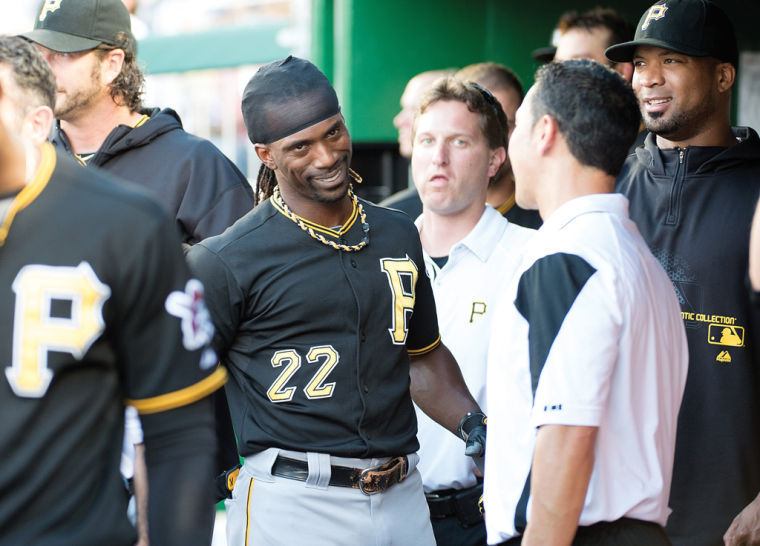Barnes Burner: Pirates’ 2013 season shouldn’t be remembered as the year the streak ended
September 4, 2013
The Pittsburgh Pirates finally did it. The Battlin’ Buccos won game No. 81 Tuesday night, and the most infamous losing streak in professional sports history ended before it could reach 21 years.
21, for those who don’t know, is the number of possibly the greatest Pirate to ever don a uniform — both as a player and a person. Pirates manager Clint Hurdle said he’d spoken to the Clemente family throughout the season about the number and the family’s desire for the streak not to reach it.
It didn’t.
And here’s the best part about the streak ending — it won’t be the best part of the 2013 season.
For many years of the 20 in which Pirates fans endured losing season after losing season, there were a number of opportunities for the Pirates to prevent these 20 years from ever happening. The 2012 team had one such chance, as did 70-win teams in 2002 through 2004.
Through July 2004, the team managed by Lloyd McClendon was 39-43 but stumbled to a 23-46 finish. And there was, of course, the 16-36 record to conclude last season.
Teams in 1997 and 1999 had chances to prevent discussions like the one today from ever happening after they won 79 and 78 games, respectively.
But it’s over. It’s finally over. More importantly, though, the Pirates’ season isn’t over and won’t be until the calendar flips to October.
When the 2013 season is examined, though, the Pirates’ season will not be remembered as the one that culminated with a 4-3 victory in Milwaukee in which Vin Mazzaro was the winning pitcher and Travis Snider hit the game-winning pinch-hit home run.
The achievement of winning 81 games isn’t much of an achievement if it’s looked at in a vacuum. That’s a .500 record. Average. For context, during the 20 years the streak lasted, the New York Yankees went to the playoffs 17 times and didn’t have a single sub-.500 season.
The new regime in the offices at PNC Park have made it clear over the past three seasons, and even since general manager Neal Huntington took over in 2007, that the Pirates had no intentions of being just average.
Huntington’s trades of players such as Nate McLouth, Xavier Nady and Jason Bay began the process of what he called “flooding the organization with minor-league talent.” Check that one off as mission complete, despite public outcry.
Bay bought Bryan Morris. Nady brought back Jose Tabata and Jeff Karstens. McLouth netted Pirates All-Star lefty Jeff Locke and Charlie Morton, who’s having the best season of his career.
Beyond the majors, look around the entire organization. The Pirates have talent everywhere.
There are Jameson Taillon, Luis Heredia, Tyler Glasnow, Nick Kingham and others who should throw off PNC Park’s mound in the near future, as well as Alex Dickerson and Alen Hanson, players who should become mainstays at first base and shortstop, respectively.
In the outfield, Gregory Polanco has become one of baseball’s top prospects and is accompanied by Josh Bell, Barrett Barnes and 2013 first-rounder Austin Meadows, who has destroyed the low-A levels in which he’s played since he was drafted.
Even behind the plate, after Russell Martin leaves when his two-year deal expires, 2009 first-rounder Tony Sanchez will take over. Behind him, Wyatt Mathisen, Jin-De Jhang and 2013 No. 14-overall pick Reese McGuire wait.
And now that the Pirates have this talent, it’s turning into major-league-ready talent, whether it’s the emergence of 2011 No. 1-overall pick Gerrit Cole making his debut in 2013 or trading away prospects to bring in impact bats like Marlon Byrd and Justin Morneau.
Obviously, not every major prospect turns out to be the next superstar. Not every guy with hype turns out to be Mike Trout or Stephen Strasburg.
But the more minor-league talent a team has, chances are better that a few more will turn out to what’s expected. It’s self-evident with this Pirates lineup featuring home-grown talent in the form of Cole, Pedro Alvarez, Andrew McCutchen, Starling Marte and Neil Walker.
Unfortunately, the fans have spent the past few seasons focusing on ending the streak instead of aiming for the goals the Pirates organization has for itself. Remember, these are the same fans Hurdle has said from day one that he would like to reconnect with their city’s baseball team. Based on the 17 sellouts at PNC Park this year, it’s clear that Hurdle is close to reaching his goal.
To fans, though, I recommend you bear in mind the words Hurdle has said so many times when asked about small accomplishments along the journey of the 2013 season: “We’re pleased. We’re not satisfied.” These words are an echo of the vision instilled in the Pirates’ front office by not only Huntington, but even Bob Nutting and Frank Coonelly, as well, that has made its way into the Pirates’ on-field product:
So, what will satisfy the Pirates? When he addressed the media following the acquisition of Morneau, Huntington was asked if this team is one he expects to compete in the World Series.
“We do,” Huntington said. “People will probably mock that statement, but we do.”



